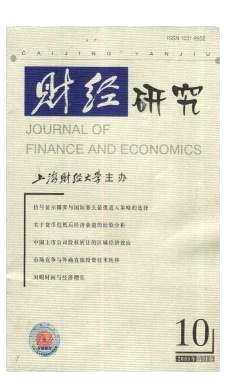闲暇时间与经济增长——兼对中国数据的实证检验
财经研究 2005 年 第 31 卷第 10 期, 页码:97 - 109
摘要
参考文献
摘要
文章放宽了国外对闲暇研究的假设条件,突出考虑闲暇时间对人力资本形成的作用和对技术进步的外部性,将闲暇时间引入增长模型研究了闲暇与增长的动态关系,并对中国1981~2003年的经济数据进行了实证检验。实证检验结果表明,健康的闲暇活动能促进经济增长,但工业化阶段居民较低的闲暇偏好会拉低经济增长率,因此总体上闲暇时间对我国经济增长展现出微小的负作用。为此文章提出,应在加大精神文明建设力度的同时,合理安排契合本国经济发展阶段的公休假制度。
[1]蔡,都阳.“文化大革命”对物质资本和人力资本的破坏[J].经济学季刊,2003,2(4):795~806.
[2]宋光辉.不同文化程度人口对我国经济增长的贡献[J].财经科学,2003,(1):34~42.
[3]杨小凯.经济学:新兴古典与新古典框架[M].北京:社会科学文献出版社,2003.
[4]Arrow K J.The economic implications of learning by doing[J].Review of EconomicStudies,1962,29:155~173.
[5]Barro,Robet J,Xavier Sala-I-Martin.Public finance in models of economic growth[J].Review of Economic Studies,1992,59:645~661.
[6]Chase E S.Leisure and consumption[A].in K.Shell(ed.),Essays on the Theory of Op-timal Economic Growth[C].Cambridge:MIT Press,1967.
[7]Eichenbaum S M,Hansen L P,S F Richard.The dynamic equilibrium pricing of durableconsumption goods[Z].manuscript,Carnegie-Mellon University,1985.
[8]Gali J.Technology,employment and the business cycle:Do technology shocks explainaggregate fluctuation?[J].American Economic Review,1999,89(1):249~271.
[9]Hall R E.Labor supply and aggregate fluctuation[A].in K.Brunner and A.Meltzer(ed.).On the state of macroeconomics,carnegie-rochester conference on public policy[C],XII,Amsterdam:North-Holland,1980.
[10]Jones Charles I.R&D-based modeld of economic growth[J].Journal of Political Econo-my,1995,103(8):759~784.
[11]Jones Charles I.Time series tests of endogenous growth models[J].Quarterly Journalof Economics,1995,110(2):495~525.
[12]Jones Charles I.Introduction to economic growth[M].W.W.Norton&Company,Inc.,USA,1998.
[13]Kaldor N.Capital accumulation and economic growth[Z].In The Theory of Capital,e-d.F.A.Lutz and C.C.Hague.New York:St.Martins,1961.
[14]Kydland F E,E C Prescott.Time to build and aggregate fluctuations[J].Econometrica,L,1982,8:1345~1370.
[15]Kydland F E.Business cycle and aggregate labor market fluctuation[A].inT.F.Cooley(ed.).Frontier of business cycle research[C].Princeton:Princeton Univer-sity Press,1995.
[16]Lucas R E.On the mechanism of economic development[J].Journal of Monetary Eco-nomics,1988,22:3~42.
[17]Mankiw,N Gregory,Romer,David&Weil,David N.A contribution to the empirics ofeconomic growth[J].Quarterly Journal of Economics,1992,107(2):407~437.
[18]Romer P M.Increasing returns and long run growth[J].Journal of Political Economy,1986,94(5):1002~1037.
[19]Romer P M.Capital,labor and productivity[J].Brookings Papers on Economic ReviewPapers on Economy,1990,98(5):71~102.
[20]Rubinstein M.An aggregation theorem for securities market[J].Journal of Financial E-conomies,1974,1:225~244.
[21]Ryder H E,Stafford F P,Stephan,P E.Labor,leisure and training over the life cycle[J].International Economic Review,1976,17:651~674.
①为分析简便,我们假设闲暇时间对技术水平存量具有外部性,但也有可能(或许这是更现实的情况)闲暇时间对技术水平增量具有外部性(此时.A代替了(5)式中的A)。
②在此我们支持卢卡斯(Lucas)和琼斯(Jones,1998)等人的观点,认为个体通过不工作而在闲暇时间里学习新技能来积累其人力资本。
[2]宋光辉.不同文化程度人口对我国经济增长的贡献[J].财经科学,2003,(1):34~42.
[3]杨小凯.经济学:新兴古典与新古典框架[M].北京:社会科学文献出版社,2003.
[4]Arrow K J.The economic implications of learning by doing[J].Review of EconomicStudies,1962,29:155~173.
[5]Barro,Robet J,Xavier Sala-I-Martin.Public finance in models of economic growth[J].Review of Economic Studies,1992,59:645~661.
[6]Chase E S.Leisure and consumption[A].in K.Shell(ed.),Essays on the Theory of Op-timal Economic Growth[C].Cambridge:MIT Press,1967.
[7]Eichenbaum S M,Hansen L P,S F Richard.The dynamic equilibrium pricing of durableconsumption goods[Z].manuscript,Carnegie-Mellon University,1985.
[8]Gali J.Technology,employment and the business cycle:Do technology shocks explainaggregate fluctuation?[J].American Economic Review,1999,89(1):249~271.
[9]Hall R E.Labor supply and aggregate fluctuation[A].in K.Brunner and A.Meltzer(ed.).On the state of macroeconomics,carnegie-rochester conference on public policy[C],XII,Amsterdam:North-Holland,1980.
[10]Jones Charles I.R&D-based modeld of economic growth[J].Journal of Political Econo-my,1995,103(8):759~784.
[11]Jones Charles I.Time series tests of endogenous growth models[J].Quarterly Journalof Economics,1995,110(2):495~525.
[12]Jones Charles I.Introduction to economic growth[M].W.W.Norton&Company,Inc.,USA,1998.
[13]Kaldor N.Capital accumulation and economic growth[Z].In The Theory of Capital,e-d.F.A.Lutz and C.C.Hague.New York:St.Martins,1961.
[14]Kydland F E,E C Prescott.Time to build and aggregate fluctuations[J].Econometrica,L,1982,8:1345~1370.
[15]Kydland F E.Business cycle and aggregate labor market fluctuation[A].inT.F.Cooley(ed.).Frontier of business cycle research[C].Princeton:Princeton Univer-sity Press,1995.
[16]Lucas R E.On the mechanism of economic development[J].Journal of Monetary Eco-nomics,1988,22:3~42.
[17]Mankiw,N Gregory,Romer,David&Weil,David N.A contribution to the empirics ofeconomic growth[J].Quarterly Journal of Economics,1992,107(2):407~437.
[18]Romer P M.Increasing returns and long run growth[J].Journal of Political Economy,1986,94(5):1002~1037.
[19]Romer P M.Capital,labor and productivity[J].Brookings Papers on Economic ReviewPapers on Economy,1990,98(5):71~102.
[20]Rubinstein M.An aggregation theorem for securities market[J].Journal of Financial E-conomies,1974,1:225~244.
[21]Ryder H E,Stafford F P,Stephan,P E.Labor,leisure and training over the life cycle[J].International Economic Review,1976,17:651~674.
①为分析简便,我们假设闲暇时间对技术水平存量具有外部性,但也有可能(或许这是更现实的情况)闲暇时间对技术水平增量具有外部性(此时.A代替了(5)式中的A)。
②在此我们支持卢卡斯(Lucas)和琼斯(Jones,1998)等人的观点,认为个体通过不工作而在闲暇时间里学习新技能来积累其人力资本。
引用本文
魏翔. 闲暇时间与经济增长——兼对中国数据的实证检验[J]. 财经研究, 2005, 31(10): 97–109.
导出参考文献,格式为:
下一篇:国际维度下的中国市场经济演进评议





 7207
7207  6398
6398

